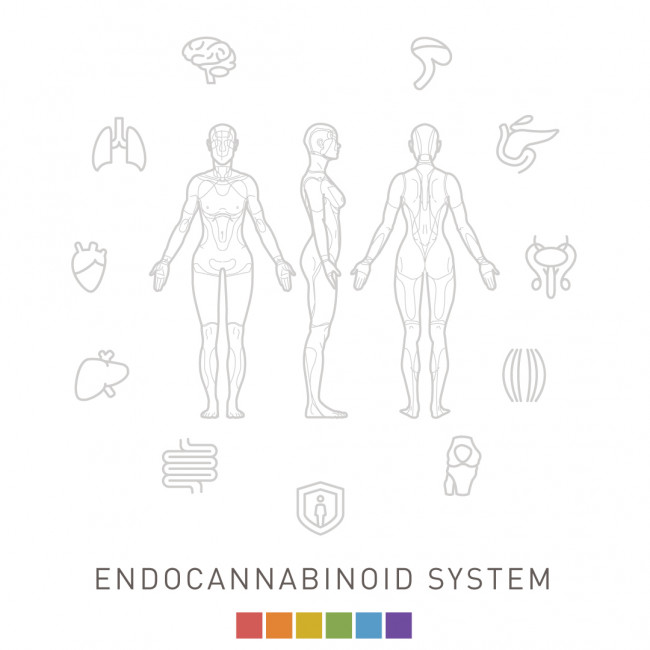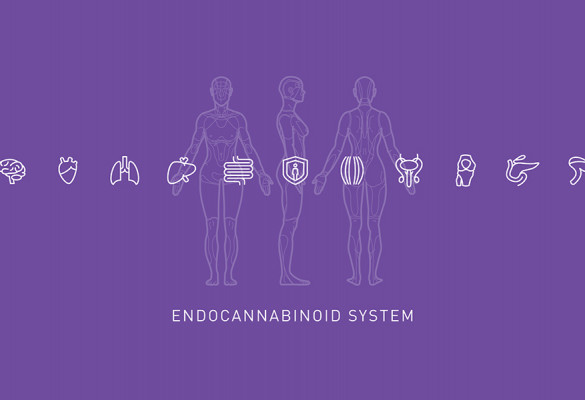Did you know you have an Endocannabinoid System? An endo-what, you ask?
Your Endocannabinoid System or ECS consists of a network of molecules called endocannabinoids, proteins, enzymes and receptors identified by scientists in the late 1980s and early 1990s.1 These receptors, cannabinoid receptor type 1 (CB1) and cannabinoid receptor type 2 (CB2), are present throughout your body and brain. They are affected by molecules found in your body that make up part of your ECS called endocannabinoids. Endo is from the word endogenous and means inside the body and endocannabinoids which are molecules that are naturally produced in mammals and other vertebrates - birds, reptiles, amphibians, and fish - which binds to those same brain receptors as cannabinoids derived from cannabis. 2,3
Endocannabinoids were named in reference to the cannabis plant's “cannabinoids” to label similar chemical compounds found in mammals - including humans.4 A variety of plants contain phytocannabinoids, “phyto” meaning plant, and are called cannabinoids for short.

What does your endocannabinoid system do?
To recap: Your ECS is a complex, interacting network of receptors and molecules that produce and eliminate chemical molecules (endocannabinoids) that in turn bind or block receptors that set off or pause specific activities. Those activities are part of the normal, day-to-day, automatic functioning of our bodies and brains.
Through research, scientists are learning that the ECS is present in, and helps regulate, your other systems including your nervous system, immune system, endocrine, respiratory, and reproductive systems. Your endocannabinoid system is part of many of your body's processes including learning and memory, pain, mood, sleep, appetite, and reproduction.5,6
Why didn’t you learn about the ECS in science class?
If you think about the scientific discovery of other systems in your body, many were identified in previous centuries such as the respiratory and reproductive systems in the 1600s, the immune system in the 1700s and the digestive system in the 1800s. Elements of the ECS were identified in the 1990s and the information has yet to reach most medical school programs, much less grade school science classes.
How is your ECS important to your health?
Scientists are discovering that your ECS could play an important part in both health and disease. An ECS with properly functioning receptors and sufficient cannabinoids in our body as helping our body's symptoms to achieve homeostasis, a condition that is in “harmony” or “balance.” They also describe this condition as “ECS tone.”7,8
More research, including clinical trials, are needed to understand how the human Endocannabinoid System works and how this intricate system affects our overall health and wellbeing. Knowing that we have an ECS is a good place to start when exploring how phytocannabinoids (plant cannabinoids) interact with our bodies and our brains.
Footnotes
- Cannabinoid pharmacology: the first 66 years (British Journal of Pharmacology)
- Evolutionary origins of the endocannabinoid system (Gene)
- Definition of “endocannabinoid” in Merriam-Webster dictionary
- Human Endocannabinoid System (UCLA Health)
- Getting High on the Endocannabinoid System (Cerebrum)
- Modulating the endocannabinoid system in human health and disease: successes and failures (The FEBS Journal)
- The Endocannabinoid System in Energy Homeostasis and the Etiopathology of Metabolic Disorders (CellPress)
- Clinical Endocannabinoid Deficiency Reconsidered: Current Research Supports the Theory in Migraine, Fibromyalgia, Irritable Bowel, and Other Treatment-Resistant Syndromes (Cannabis and Cannabinoid Research)
